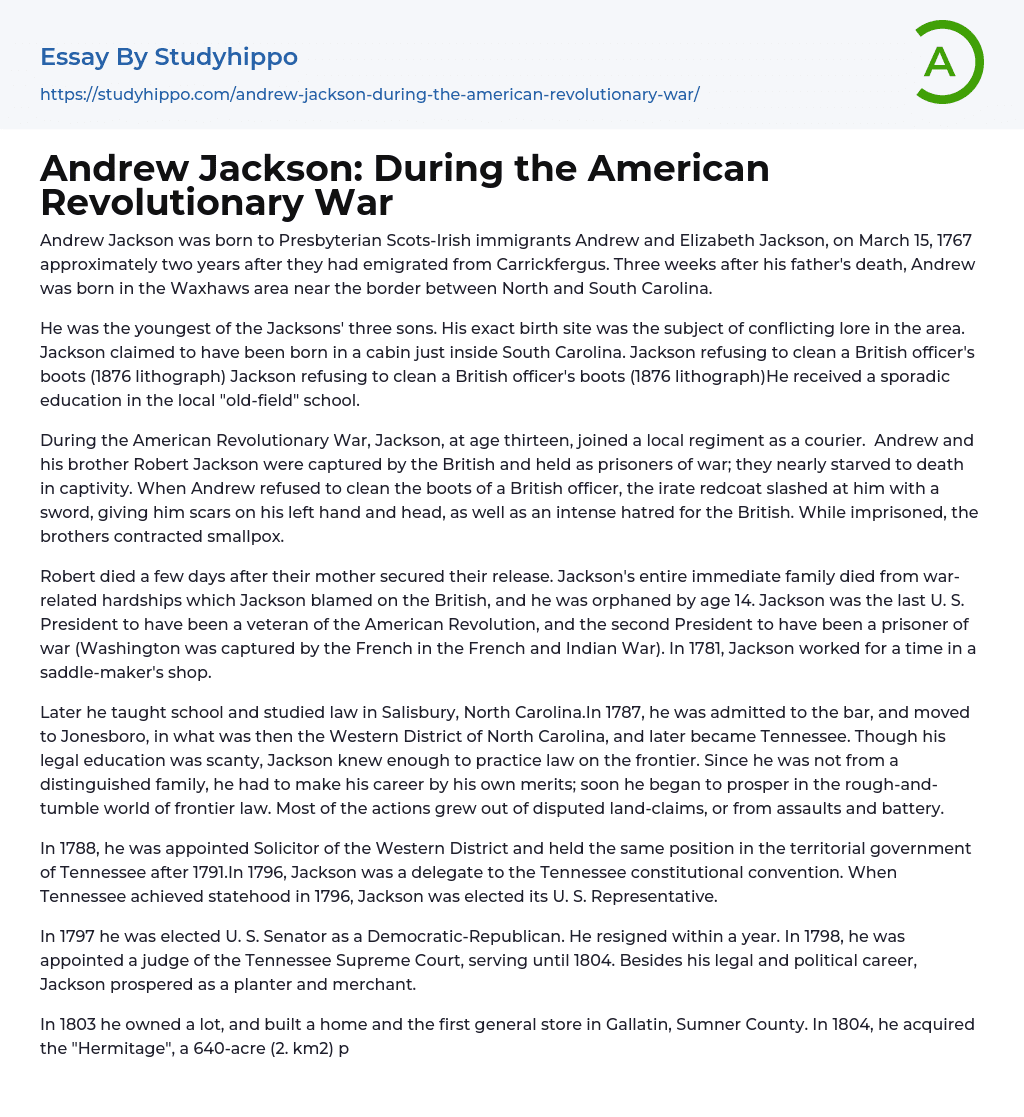

Andrew Jackson: During the American Revolutionary War Essay Example
Andrew Jackson was born to Presbyterian Scots-Irish immigrants Andrew and Elizabeth Jackson, on March 15, 1767 approximately two years after they had emigrated from Carrickfergus. Three weeks after his father's death, Andrew was born in the Waxhaws area near the border between North and South Carolina.
He was the youngest of the Jacksons' three sons. His exact birth site was the subject of conflicting lore in the area. Jackson claimed to have been born in a cabin just inside South Carolina. Jackson refusing to clean a British officer's boots (1876 lithograph) Jackson refusing to clean a British officer's boots (1876 lithograph)He received a sporadic education in the local "old-field" school.
During the American Revolutionary War, Jackson, at age thirteen, joined a local regiment as a courier. Andrew and his brother Robert Jackso
...n were captured by the British and held as prisoners of war; they nearly starved to death in captivity. When Andrew refused to clean the boots of a British officer, the irate redcoat slashed at him with a sword, giving him scars on his left hand and head, as well as an intense hatred for the British. While imprisoned, the brothers contracted smallpox.
Robert died a few days after their mother secured their release. Jackson's entire immediate family died from war-related hardships which Jackson blamed on the British, and he was orphaned by age 14. Jackson was the last U. S. President to have been a veteran of the American Revolution, and the second President to have been a prisoner of war (Washington was captured by the French in the French and Indian War). In 1781, Jackson worked for a time in a saddle-maker's shop.
Later he taugh
school and studied law in Salisbury, North Carolina.In 1787, he was admitted to the bar, and moved to Jonesboro, in what was then the Western District of North Carolina, and later became Tennessee. Though his legal education was scanty, Jackson knew enough to practice law on the frontier. Since he was not from a distinguished family, he had to make his career by his own merits; soon he began to prosper in the rough-and-tumble world of frontier law. Most of the actions grew out of disputed land-claims, or from assaults and battery.
In 1788, he was appointed Solicitor of the Western District and held the same position in the territorial government of Tennessee after 1791.In 1796, Jackson was a delegate to the Tennessee constitutional convention. When Tennessee achieved statehood in 1796, Jackson was elected its U. S. Representative.
In 1797 he was elected U. S. Senator as a Democratic-Republican. He resigned within a year. In 1798, he was appointed a judge of the Tennessee Supreme Court, serving until 1804. Besides his legal and political career, Jackson prospered as a planter and merchant.
In 1803 he owned a lot, and built a home and the first general store in Gallatin, Sumner County. In 1804, he acquired the "Hermitage", a 640-acre (2. km2) plantation in Sumner County, near Nashville. Jackson later added 360 acres (1. 5 km2) to the farm.
The primary crop was cotton, grown by enslaved workers. Jackson started with nine slaves, by 1820 he held as many as 44, and later held up to 150 slaves.
Bibliography
- Wilentz, Sean. Andrew Jackson (2005), p. 8, 35.
- "Andrew Jackson". Information Services Branch, State Library of North Carolina.
- "Andrew Jackson Cottage and
US Rangers Centre". Northern Ireland Tourist Board.
- Abolitionism essays
- Adam Smith essays
- American History essays
- American Revolution essays
- Ancient Egypt essays
- Articles Of Confederation essays
- Atlantic Slave Trade essays
- Aztec essays
- Benjamin Franklin essays
- Civil Rights Act of 1964 essays
- Civil Rights Movement essays
- Civil war essays
- Cleopatra essays
- French And Indian War essays
- Gettysburg essays
- Great Depression essays
- Hurricane Katrina essays
- Industrial Revolution essays
- Jamestown essays
- Manifest Destiny essays
- Mccarthyism essays
- Patrick Henry essays
- Pearl Harbor essays
- Pocahontas essays
- Prohibition essays
- Pyramids essays
- Salem Witch Trials essays
- Slavery essays
- The New Deal essays
- Thirteen Colonies essays
- Westward Expansion essays
- Abraham Lincoln essays
- Andrew Jackson essays
- Barack Obama essays
- Bill Clinton essays
- Donald Trump essays
- Franklin D. Roosevelt essays
- George W. Bush essays
- George Washington essays
- James Madison essays
- John F. Kennedy essays
- Lyndon B. Johnson essays
- Richard Nixon essays
- Theodore Roosevelt essays
- Thomas Jefferson essays
- Vice President essays
- John Locke essays
- 9/11 essays
- A Good Teacher essays
- A Healthy Diet essays



